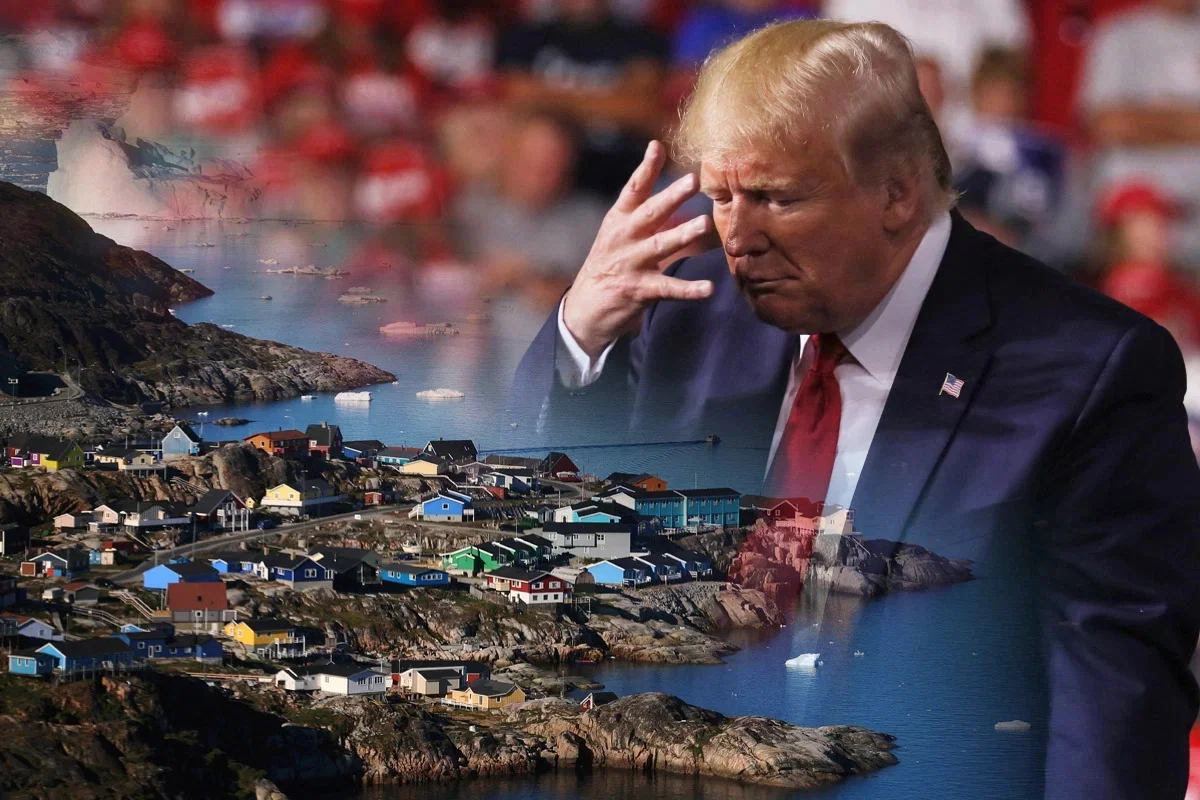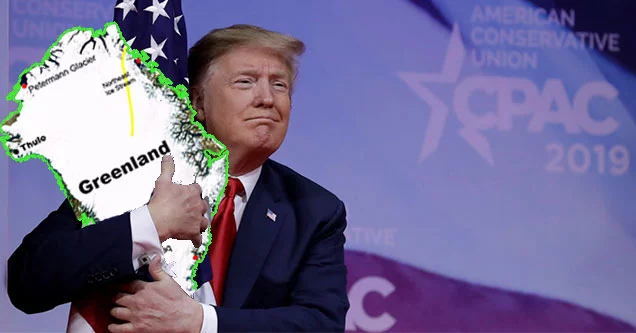Trump wants to take over Greenland, do Greenlanders want to be the 51st US state?

Trump is eager to gain control over Greenland. He is ready to buy the island and does not rule out the possibility of a military invasion. Danish officials have repeatedly rejected the offer, while increasing defense spending and seeking support from European countries.
Meduza analyzed whether Denmark is ready for an armed conflict and what Greenlanders think about it.
Trump once again expressed his desire to buy Greenland. The refusal angered him. Denmark strengthened its defenses after this
“There was no turning back from it. It was like a cold shower. […] I think the situation is serious and potentially very dangerous,” a source told the Financial Times about a phone call between US President Donald Trump and Danish Prime Minister Mette Frederiksen.
The 45-minute conversation focused on the issue of establishing control over Greenland. According to the FT, it went “very badly.” Although Frederiksen proposed developing cooperation on military bases and natural resource extraction, Trump was “aggressive” and “in a confrontational mood,” the sources said.
The Danish prime minister’s office did not confirm “anonymous sources’ comments about the conversation.” However, shortly after the conversation, Denmark rushed to increase its defense spending on Greenland – while Danish Defense Minister Troels Lund Poulsen said that this decision was not related to recent events. He even called it “a joke of fate.”
This is not Trump’s first attempt to buy Greenland. Brief history
The first talk of buying Greenland emerged during Trump's first term in office, in August 2019. At that time, he proposed paying $600 million annually for the island. Danish Prime Minister Mette Frederiksen called the idea "absurd" and stressed that "Greenland is not for sale, it does not belong to Denmark, but belongs to the Greenlanders themselves."

Following this rejection, the US president canceled his planned visit to Copenhagen. A few months later, the US consulate in Nuuk, the capital of Greenland, which had been closed since 1953, reopened.
After that, the situation seemed to stabilize. Frederiksen expressed hope that Trump's offer was not serious: "Thankfully, the times when countries and peoples could be bought or sold are over. Let's leave that joke there."
However, five years later, Trump has clearly shown that he has not changed his mind and is taking the issue seriously.
Danish Defense Minister Troels Lund Poulsen admitted that for many years Copenhagen has been cutting defense spending and has not purchased enough warships and aircraft to protect Greenland. Now, however, he wants to change that.
The government plans to purchase three new Arctic patrol ships and increase the number of Arctic reconnaissance and patrol units using dog sleds. It has also allocated $ 400 million to develop surveillance and reconnaissance systems in the Arctic and North Atlantic. The funds will also be used to purchase two new drones with long-range capabilities.
In addition, on January 27, Copenhagen signed a new defense agreement with Greenland and the Faroe Islands and announced that it would allocate 14.6 billion Danish kroner ($ 2.1 billion) to strengthen its military presence in the Arctic. For comparison: last year, Denmark allocated $ 26 billion for defense spending over a decade (which is $ 2.6 billion per year). Moreover, only a fraction of this amount was planned to be spent on the Arctic.
According to the BBC, this defense plan was discussed in advance and it would be wrong to perceive it as a response to Trump's words.
Denmark cannot defend itself, and Europe is taking a cautious approach
Increasing defense spending is just one of the measures the Danish government is taking. In addition, it is clear that Copenhagen is trying to find external support. On January 28, Prime Minister Mette Frederiksen visited three European capitals in one day, speaking of a “stronger and more assertive Europe” and stressing the need to take greater responsibility for security.
European politicians supported the Danish prime minister. German Chancellor Olaf Scholz said that “borders will not be changed by force” and that “Europe will act together.” French President Emmanuel Macron said that “European countries have understood that we are entering a new phase of cooperation with the United States.”
NATO Secretary General Mark Rutte also confirmed that the alliance members should strengthen their Arctic defenses. But the most radical statement was made by Robert Brieger, an Austrian general and chairman of the European Union Military Committee. He suggested considering the possibility of sending EU troops to Greenland. At the same time, in his opinion, these forces should be stationed there not instead of US troops, but together with them.
At a press conference on February 3, Danish Prime Minister Mette Frederiksen once again emphasized that Greenland “belongs to us and is not for sale.” She also called on European countries to respond firmly to Donald Trump’s threats.
However, the Danish government does not want to enter into an open conflict with the United States. According to the Financial Times, Copenhagen has asked its EU and NATO allies to be careful. The reason is clear: Ulrike Pram Gad, a leading researcher at the Danish Institute of International Affairs, told TV2 that Denmark is not able to defend not only Greenland, but also its own territory on its own.
Diplomatic relations between Denmark and the United States remain open. On January 24, Danish Foreign Minister Lars Løkke Rasmussen met with U.S. Secretary of State Marco Rubio, reaffirming the strong ties between the two countries.
A week later, Rasmussen, commenting on Rubio’s interview, stressed that some U.S. interests are fully aligned with Danish interests. Prime Minister Mette Frederiksen also acknowledged that the Arctic is becoming increasingly important from a defense and security perspective.
Danish Prime Minister Mette Frederiksen is using the tactic of showing that she takes U.S. President Donald Trump’s concerns about Chinese and Russian threats in the Arctic seriously. She argues that if the main goal is to ensure regional security, there are appropriate ways to do so:
“If the goal is to ensure the security of our part of the world, we can find ways to achieve that,” Frederiksen says.
Major Steen Kergoer of the Danish Defense Academy also suggests that Trump's raising of the issue may be aimed at pressuring Denmark to expand its military capabilities in Greenland.
What do Greenlanders themselves think?
Greenland residents reject the idea of becoming the 51st state of the United States: 85 percent of those polled are against the proposal, while 55 percent prefer to retain Danish citizenship. However, 45 percent of respondents said that Trump's interest in the island could bring new economic opportunities, while 43 percent were concerned about it.
Greenland's Prime Minister Mute Egede urged caution in this situation, stressing that he is ready to cooperate with the United States, but that Greenland's ultimate goal is to achieve full independence. Other political forces on the island also support this position.
However, some experts are critical of the government's actions. Former head of the Greenlandic Association of Municipalities, Martha Labansen, called the government's lack of openness about the situation "a disgrace for a democratic country." Former head of Greenlandic self-government Kai Kleist said that Prime Minister Mute Egede's position raises the question among the population: "Who ultimately controls Greenland: the United States or Denmark?"
Akkaluq Linge, founder of the People's Unity party, which formed the governing coalition, considers such caution natural. In his opinion, this is the first time in Greenland's history that "the existence of the island is in question."
Greenlandic Prime Minister Mute Egede and his coalition are refraining from responding sharply to Trump's pressure. The reason for this is the parliamentary elections that will be held in two months. On February 3, the government submitted a special bill to parliament to prevent foreign interference. According to it, political parties are prohibited from receiving funds from foreign or anonymous donors, and private donations are limited to 200,000 Danish kroner (about $27,700). Each donor cannot donate more than 20,000 kroner.
Meanwhile, Greenland's media and public figures are urging the population not to panic. "The main thing at a time like this is to stay calm. Take a deep breath and don't get carried away by unrealistic scenarios," psychologist Niina Isaksen told the newspaper Sermitsiaq. However, she did not specify which scenarios are real and which are fiction. Read “Zamin” on Telegram!
Ctrl
Enter
Found a mistake?
Select the phrase and press Ctrl+Enter 





















